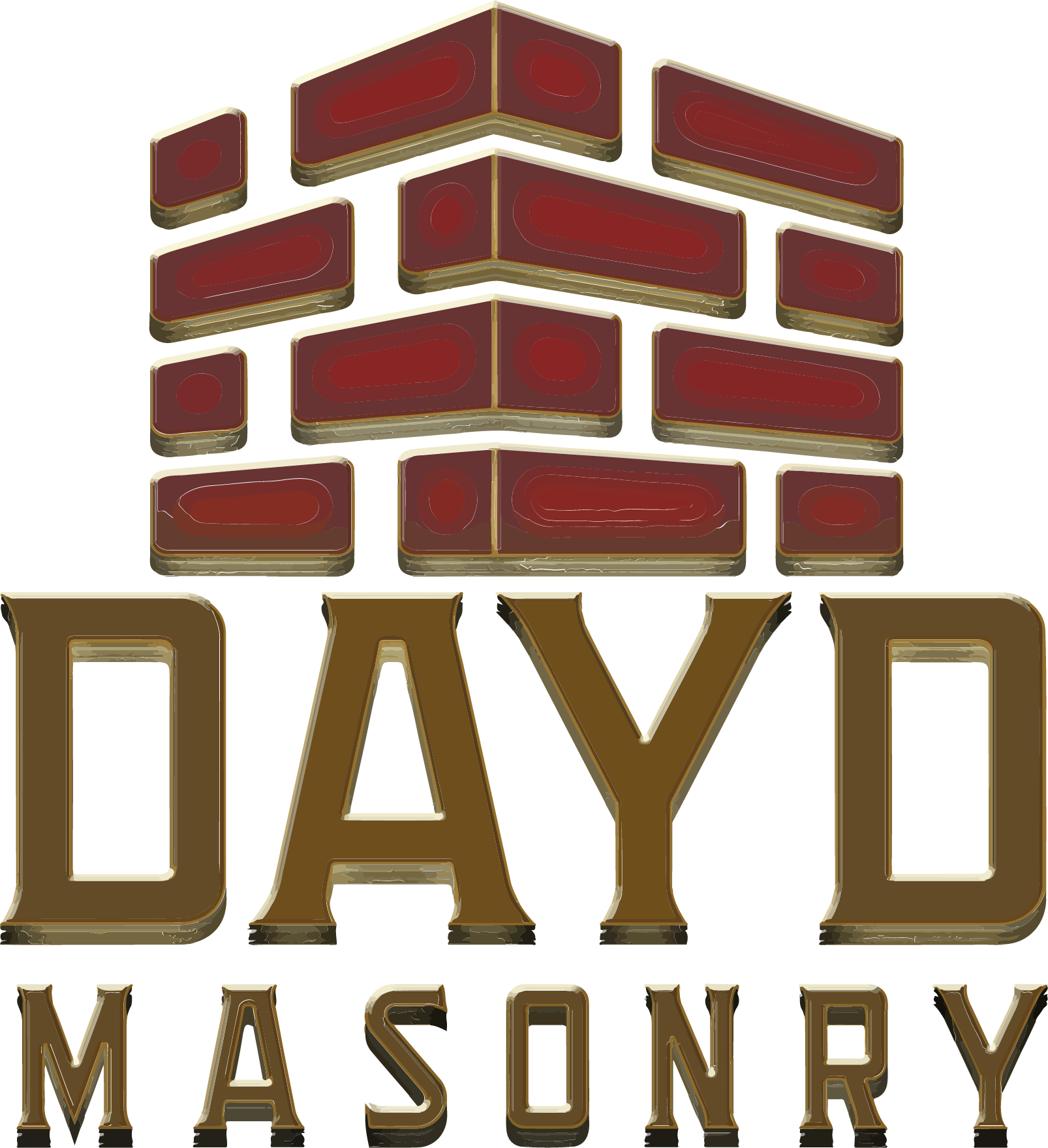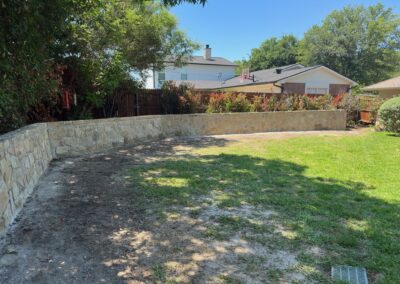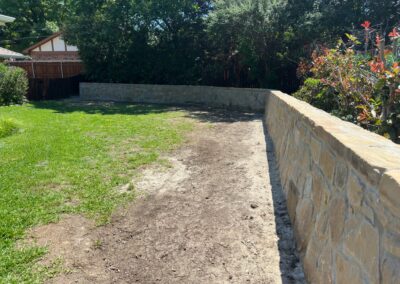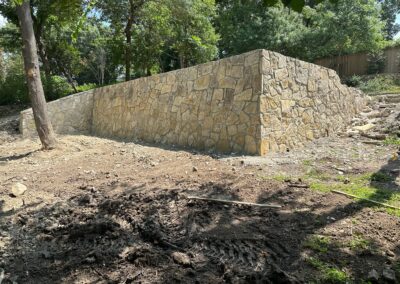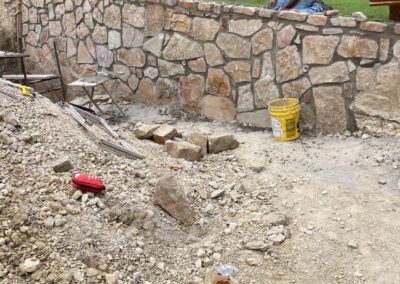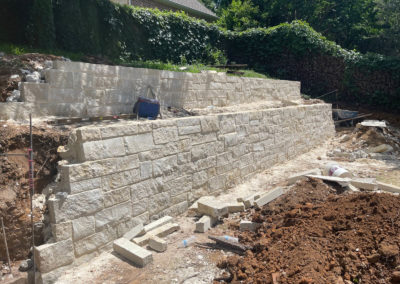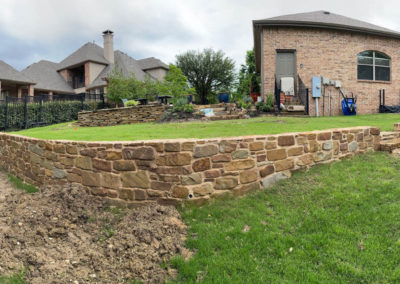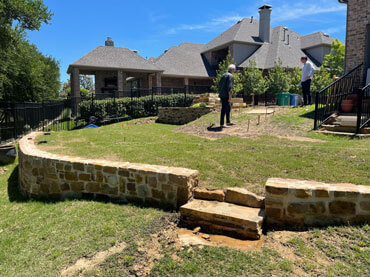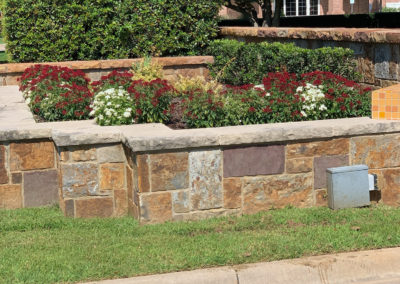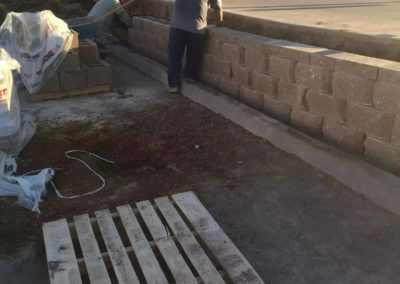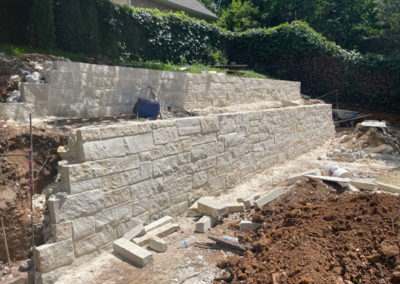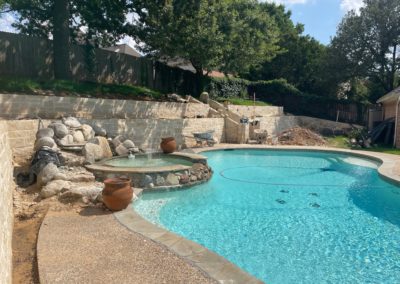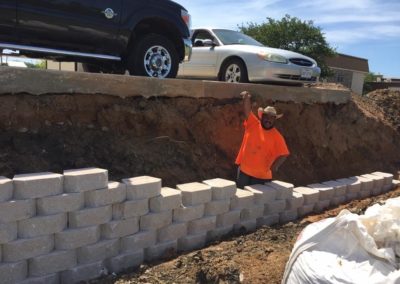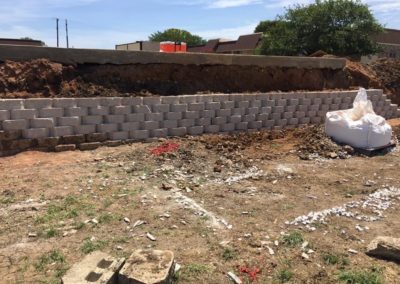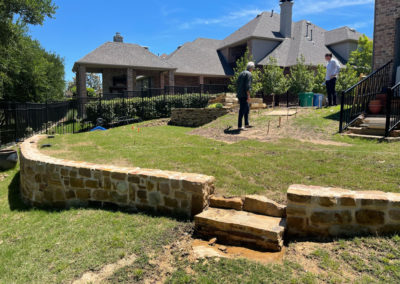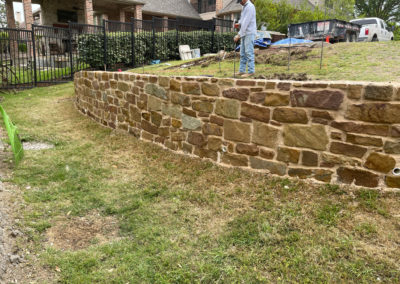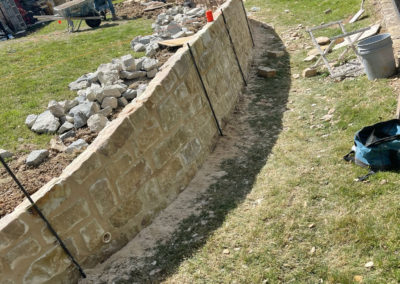Retaining Walls in Fort Worth & Dallas
What are Retaining Walls?
The retaining wall definition is a structure that supports holding back soil or other materials on a slope to prevent erosion.
Retaining walls is critical in landscaping and constructing commercial and residential properties. They’re designed to stabilize slopes, prevent soil erosion, and create usable space.
Stabilizing Slopes
This is common in landscape gardening, building structures, or creating recreational areas.
Preventing Erosion
Retaining walls can also be designed to control and redirect water runoff. This slows down the flow of water and minimizes erosion.
Creating Usable Space
They’re also a standard solution to create terraced landscapes to transform steep and unusable terrain into flat, easily accessible areas for gardening and recreation.
Retaining wall contractors can design different types to suit varying needs and environments. Examples are gravity walls, cantilever walls, and anchored walls.
Regarding retaining walls, Fort Worth, TX, residents can rely on Dayd Masonry. With years of experience, our team of experts is ready to help you design and construct quality retaining walls using natural and paved stones or cross ties that meet your needs and enhance your property’s beauty.
The Benefits of a Retaining Wall
Increased Usable Space
This allows homeowners and city planners to utilize otherwise inaccessible or unproductive spaces.
For example, a retaining wall installation can create flat surfaces suitable for patios and gardens for outdoor entertaining or cultivating flowers and vegetables.
It also makes constructing additional outdoor structures like pergolas or gazebos possible.
Erosion Control
They act as a barrier against water run-offs and wind forces that can wash away soil and potentially undermine foundations, causing significant damage.
High-quality wall services stabilize slopes effectively and defend against such erosive forces, ensuring your property remains structurally sound and visually appealing.
Improved Drainage
With proper drainage systems installed behind the retaining wall, it can effectively divert water away from your property.
As a result, it prevents water damage to the wall and safeguards your home or commercial buildings from potential water-related damage.
Enhanced Curb Appeal
Some ways retaining walls add visual appeal are:
- Terraced landscapes: They transform steep terrain into level, usable spaces that can have a visually striking multi-tiered effect on the landscape.
- Decorative finishes: Retaining walls can be constructed using various materials, including natural stone, bricks, concrete blocks, or even wood that can complement the surrounding environment.
- Planting opportunities: Allows you to incorporate flowers, shrubs, or other greenery that softens the hard lines of the wall and adds a vibrant dimension to the overall design.
Through various ways, your retaining wall contractor can help you create a wall that can significantly enhance the curb appeal of your property.
Additional Benefits
- Retains heat: They can help keep heat in the soil to create a microclimate conducive to plant growth.
- Reduces noise: In urban settings like Dallas, retaining walls can reduce noise pollution by acting as a sound barrier against traffic and other environmental noises.
- Prevents fires: They can act as firebreaks by creating barriers that can disrupt the path of flames and prevent further damage.
- Enhances privacy: High retaining walls create privacy by blocking the view from neighboring properties or streets.
- Structural support: The walls can support buildings constructed on sloping terrain by preventing soil movement.
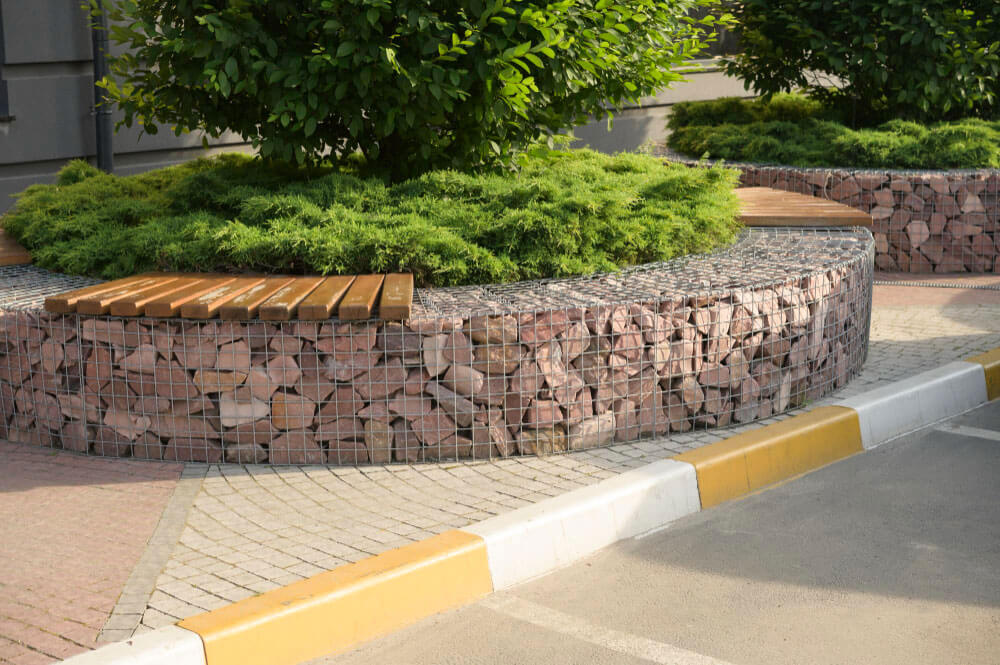
Get a Quote
Your Retaining Wall Options with Dayd Masonry
Dayd Masonry offers various materials for wall construction that can enhance your home or business architecture:
Natural Stone
Every stone has a unique pattern that adds character and charm to your property.
For example, limestones are known for their soft, warm tones, ranging from creamy beige to light gray. They give a classic, elegant appearance that blends well with various landscaping styles.
Meanwhile, sandstones have a more comprehensive range of colors, including robust earth tones. They have natural textures and patterns that can be visually striking for any retaining wall.
Aside from visual appeal, these stones are naturally resilient to environmental changes. What you get is a long-lasting solution for your retaining wall needs.
Paving Stones
They come in a wide array of shapes, sizes, and colors. Their design versatility, ease of installation, and relatively lower cost make them an attractive choice for homeowners looking to enhance the aesthetics of their outdoor spaces.
Paving stones are often designed to interlock, thus allowing them to be installed in various configurations. This high degree of customization makes creating straight, curved, or tiered retaining walls possible.
As for their aesthetic appeal, pavers are ideal for modern architectural designs thanks to their clean lines and contemporary look.
Paving stones also come in various colors, giving home or business owners options that match or contrast with the surrounding landscape and other hardscape elements.
Cross Ties
Railroad ties, which are the wooden beams used in railway construction, lend a unique, rustic charm to your outdoor spaces.
They promote sustainability by repurposing and reusing materials that would otherwise be discarded. This can reduce the demand for lumber, conserve forests, and minimize the environmental impact of manufacturing new construction materials.
As for their rustic appeal, crossties often exhibit a weathered and aged appearance due to their exposure to the elements and years of use.
They also develop a natural patina showcasing the wood’s history and journey.
And despite being repurposed, they have an inherent strength as they’ve been designed to withstand the heavy loads and stresses associated with railway use, making them excellent for retaining wall construction.
Crossties are also cost-effective since they’re widely available, repurposed, and require minimal processing.
Other Materials
- Concrete blocks: Also known as cinder blocks, these are readily available, durable, easy to install, and cost-effective.
- Bricks: These offer a very classic and timeless appeal and are very low maintenance.
- Boulders or large rocks: Often referred to as boulder or wall construction, they can be moved around to create a natural and visually striking retaining wall.
Why Choose Dayd Masonry for Your Retaining Wall Project?
A One Stop Shop
Expertise
Durability
Customization
Local Knowledge
Satisfaction Guarantee
Free Consultation
Request a Quote for Your Retaining Wall Project Today!
On a tight budget? Don’t worry! We have flexible financing options to ensure your project doesn’t break the bank.
And our expertise goes beyond retaining walls. We also specialize in various other masonry services for your home or business, such as brickwork, stonework, and more.
Search “retaining walls near me,” and Fort Worth residents will find Dayd Masonry. We’ll transform your outdoor spaces into a beautiful, functional, and enduring landscape.
FAQ
When do I need a retaining wall?
What are the different types of retaining walls?
- Gravity walls: Typically made from heavy materials like stone and concrete, they rely on their weight and mass to resist the pressure from the soil behind them
- Cantilever walls: use a reinforced concrete slab or horizontal footing with a vertical stem to resist soil pressure.
- Gabion walls: Uses a wire mesh basket filled with stones or other materials.
- Anchor walls: Uses cables or other tensioning elements to anchor the wall into the soil and provide additional lateral support.
How high can I build a retaining wall?
However, this will still depend on several factors, like the type of material used, soil conditions, and local building regulations.
Taller walls may require additional reinforcement or professional engineering assistance. It’s always best to consult with a masonry expert like Dayd Masonry for specific recommendations for your project.
Do I need permits or professional help for my retaining wall?
Before going through your project, it’s always best to check with your local government or retain wall contractors – Fort Worth like Dayd Masonry- to ensure compliance with regulations.
This will also help you avoid any potential safety hazards or costly mistakes in the future.
How much does a retaining wall cost?
If you’re on a budget, Dayd Masonry has flexible financing options that will help make your project more manageable.
Call Us: (817) 713-0046
Get A Free Consultation & Estimate
Tell us your name, email address, and the specifics of the project you are seeking assistance with, and we will be back with you shortly.
